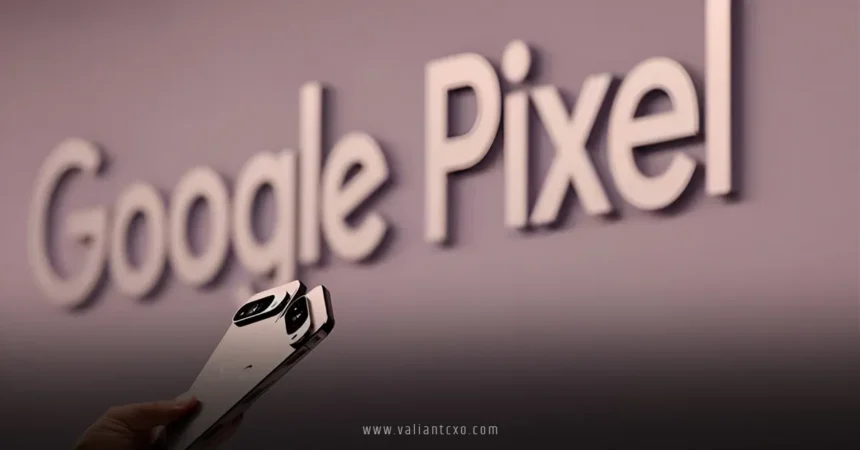Google spotlights AI over hardware upgrades in unveiling new smartphones, and it’s a game-changer! At the annual “Made by Google” event in New York, the tech giant pulled back the curtain on its latest Pixel 10 series, showcasing a bold shift in focus. Instead of dazzling us with shiny new hardware specs, Google doubled down on artificial intelligence, weaving it into every corner of its new devices. This isn’t just about faster processors or sleeker designs—it’s about making your phone smarter, more intuitive, and frankly, a little bit magical. So, what’s driving this AI revolution, and why should you care? Let’s dive in and unpack what Google’s latest move means for you, the tech world, and the future of smartphones.
Why Google Spotlights AI Over Hardware Upgrades in Unveiling New Smartphones
Picture this: you’re snapping a photo, and your phone doesn’t just capture the moment—it coaches you to make it better. Or you’re calling an airline, and your phone pulls up your flight details without you even asking. That’s the kind of wizardry Google is bringing to the table with its Pixel 10 lineup. By spotlighting AI over hardware upgrades in unveiling new smartphones, Google is betting big on software that anticipates your needs. This shift isn’t just a marketing gimmick; it’s a response to a growing trend in the tech industry where AI is becoming the heart of innovation.
The Pixel 10 series, including the Pixel 10, Pixel 10 Pro, Pixel 10 Pro XL, and the foldable Pixel 10 Pro Fold, isn’t about groundbreaking hardware leaps. Sure, there’s a new Tensor G5 chip and a nifty magnetic charging system called Pixelsnap, but the real star is Google’s AI, powered by the Gemini model. From real-time language translation during calls to a camera app that acts like a personal photography coach, Google is redefining what a smartphone can do. Why settle for a faster processor when your phone can think for you?
The AI-Powered Features Stealing the Show
When Google spotlights AI over hardware upgrades in unveiling new smartphones, it’s not just talk—there’s substance behind it. The Pixel 10 lineup introduces features that make you wonder how you ever lived without them. Here are a few standouts:
- Camera Coach: Imagine having a professional photographer in your pocket. The Pixel 10’s camera app now includes an AI-powered “coach” that guides you to take better photos. It suggests angles, lighting tweaks, and composition tips in real time. Whether you’re capturing a sunset or a selfie, this feature ensures your shots are Instagram-worthy.
- Proactive Assistant: Ever fumbled through your emails to find a flight confirmation while on hold with customer service? Google’s AI assistant now predicts what you need and displays it automatically—like pulling up your flight details when you call an airline. It’s like having a personal assistant who’s always one step ahead.
- Real-Time Translation: Language barriers? Gone. The Pixel 10’s real-time translation feature, first teased at Google’s developer conference, lets you have seamless phone conversations in different languages. It’s like carrying a universal translator from a sci-fi movie.
These features aren’t just cool—they’re practical. They show why Google spotlights AI over hardware upgrades in unveiling new smartphones, prioritizing user experience over raw power.
Modest Hardware Upgrades: A Strategic Choice?
Google Spotlights AI Over Hardware Upgrades in Unveiling New Smartphones : Let’s not kid ourselves—hardware still matters. But when Google spotlights AI over hardware upgrades in unveiling new smartphones, it’s making a calculated move. The Pixel 10 series doesn’t boast dramatic hardware changes compared to last year’s bold refresh. The exteriors of the phones are largely the same, with a few tweaks like a telephoto lens added to the base model to match the pricier versions. Prices remain steady, starting at $799 for the base Pixel 10 and $1,799 for the foldable Pixel 10 Pro Fold, despite earlier fears of price hikes due to U.S. tariffs.
The new Tensor G5 chip powers all Pixel 10 models, offering solid performance for AI-driven tasks. Google also introduced Pixelsnap, a magnetic charging system similar to Apple’s MagSafe, complete with compatible chargers, cases, and stands. While these updates are nice, they’re not the headliners. As Bob O’Donnell, chief analyst at Technalysis Research, put it, “A lot of the stuff they showed today would probably run almost exactly the same way on last year’s hardware. Their point is it’s not about just the hardware anymore.”
So, why the modest hardware approach? It’s simple: Google believes AI is the future. By focusing on software that can run on existing hardware, Google is making its devices more accessible and sustainable. Why chase incremental hardware gains when you can redefine the smartphone experience with AI?
Pixelsnap and Other Hardware Tidbits
Okay, let’s give credit where it’s due—Google didn’t completely ignore hardware. The introduction of Pixelsnap is a clever nod to Apple’s MagSafe, offering a magnetic charging system that’s both practical and stylish. It’s paired with a range of accessories, from chargers to phone stands, creating a cohesive ecosystem. The Pixel Watch 4 and Pixel Buds 2a also got minor updates, though the Pixel Buds Pro 2 only saw a new color and some software tweaks. These updates show Google’s commitment to a broader product lineup, but they’re clearly playing second fiddle to AI.
Google vs. Apple: The AI Showdown
Google Spotlights AI Over Hardware Upgrades in Unveiling New Smartphones : When Google spotlights AI over hardware upgrades in unveiling new smartphones, it’s throwing some serious shade at Apple. At its June developer conference, Apple dialed back its AI promises after failing to deliver upgrades to Siri and other products. Meanwhile, Google is charging full speed ahead, mocking Apple’s stumbles in ads that highlight the Pixel 10’s ready-to-go AI features.
Apple’s iPhones, expected to launch this autumn, face pressure to catch up in the AI race. While Apple has promised a smarter Siri, it won’t arrive until next year at the earliest. Google, on the other hand, is delivering AI innovations now. It’s like Google brought a fully loaded spaceship to a race where Apple’s still tinkering with its rocket. The Pixel 10’s AI features, powered by the Gemini model, position it as a direct competitor to the iPhone, challenging Apple to step up or risk falling behind.
Why AI Matters More Than Ever
Why is Google so obsessed with AI? Because it’s the future of how we interact with technology. Smartphones aren’t just devices anymore—they’re partners. Whether it’s helping you navigate a foreign country, editing your videos, or organizing your life, AI is what makes these tasks effortless. By spotlighting AI over hardware upgrades in unveiling new smartphones, Google is betting that consumers want smarter devices, not just faster ones.
Think of it like this: a decade ago, we were all wowed by bigger screens and better cameras. Now, those are table stakes. The real competition is about who can make your phone feel like an extension of your brain. Google’s Gemini AI is designed to do just that, offering a level of personalization and proactivity that sets the Pixel 10 apart.
The “Made by Google” Event: A New Vibe
Google Spotlights AI Over Hardware Upgrades in Unveiling New Smartphones : Google spotlights AI over hardware upgrades in unveiling new smartphones, and the “Made by Google” event itself was a reflection of that shift. Unlike past events that geeked out over technical specs, this year’s presentation in New York was all about mainstream appeal. Celebrities like Jimmy Fallon and the Jonas Brothers took the stage to demo real-world AI applications, making the tech feel relatable and fun. It’s like Google traded its lab coat for a leather jacket, aiming to connect with everyday users rather than just tech nerds.
This shift in tone is strategic. Google knows its Pixel phones have struggled to gain market share against giants like Apple and Samsung. By expanding sales to new markets like Mexico and focusing on consumer-friendly AI features, Google is trying to broaden its reach. Analysts note that Google’s limited geographical presence has held it back, but moves like this could change the game.
Expanding the Pixel’s Reach
Speaking of markets, Google’s decision to sell Pixel devices in Mexico for the first time is a big deal. The Pixel 10, Pixel 10 Pro, and Pixel 10 Pro XL hit stores later this month, while the Pixel 10 Pro Fold ships in October. This expansion is a step toward challenging Apple and Samsung’s dominance, especially in regions where Android already reigns supreme. As analyst Carolina Milanesi said, “The opportunity of the addressable market they can reach is still what is kind of holding Google back.”
SEO Implications: How Google’s AI Focus Affects the Web
Google Spotlights AI Over Hardware Upgrades in Unveiling New Smartphones : Google spotlights AI over hardware upgrades in unveiling new smartphones, but the impact goes beyond devices—it’s reshaping the internet itself. Google’s broader push into AI, like its AI Overviews and AI Mode in Search, is changing how content is discovered online. For website owners and digital marketers, this means adapting to a world where AI-generated summaries might outshine traditional links.
To stay visible, content creators need to optimize for AI-driven search. This means crafting clear, concise, and authoritative content that answers user questions directly. Google’s own advice? Focus on “unique, non-commodity content” that’s helpful and engaging. It’s like trying to stand out in a crowded room—you’ve got to have something valuable to say, and you need to say it fast.
Tips for Optimizing Content in an AI-Driven World
Here’s how you can make your content shine in Google’s AI era:
- Answer Questions Directly: AI Overviews love content that gets to the point. Structure your articles with clear headings and concise answers to common questions.
- Embrace Conversational SEO: Anticipate follow-up questions users might ask and address them in your content. Think of it like having a conversation with your reader.
- Build Authority: Google’s AI prioritizes trustworthy sources. Back up your claims with data, cite reputable sources, and showcase your expertise.
For more on optimizing for Google’s AI search, check out Google Search Central’s guide on AI experiences.
The Future of Smartphones: AI as the New Standard
Google Spotlights AI Over Hardware Upgrades in Unveiling New Smartphones : Google spotlights AI over hardware upgrades in unveiling new smartphones, and it’s setting a new benchmark for the industry. As competitors like Apple and Samsung scramble to catch up, AI is becoming the defining feature of modern smartphones. Google’s vision is clear: a phone that doesn’t just do what you ask but anticipates what you need. It’s like having a friend who finishes your sentences—except this friend lives in your pocket and speaks 50 languages.
The Pixel 10’s AI features are just the beginning. As Google continues to refine its Gemini model and roll out new capabilities, we can expect even more innovative integrations. From smarter assistants to seamless multitasking, the future of smartphones is about making life easier, not just faster.
What’s Next for Google and AI?
Looking ahead, Google’s focus on AI will likely extend beyond smartphones. The company’s work on AI Mode in Search, Project Astra, and other initiatives suggests a future where AI is woven into every aspect of our digital lives. For now, the Pixel 10 series is a glimpse of what’s to come—a world where your phone is less about specs and more about smarts.
Conclusion: Why Google’s AI Focus Matters to You
Google spotlights AI over hardware upgrades in unveiling new smartphones, and it’s a shift that’s hard to ignore. The Pixel 10 series isn’t about flashy new hardware; it’s about making your phone a smarter, more helpful companion. From coaching you through better photos to breaking down language barriers, Google’s AI-driven approach is redefining what a smartphone can do. For consumers, this means a more intuitive experience. For competitors, it’s a wake-up call to step up their AI game. And for content creators, it’s a reminder to adapt to an AI-driven world. So, whether you’re a tech enthusiast or just someone who wants a phone that gets you, Google’s latest move is worth getting excited about. Ready to see what AI can do for you? The Pixel 10 might just be your ticket to the future.
FAQs
1. Why does Google spotlight AI over hardware upgrades in unveiling new smartphones?
Google is focusing on AI to make its Pixel 10 series smarter and more user-friendly, offering features like real-time translation and a camera coach that enhance everyday tasks without needing major hardware changes.
2. What are some key AI features in the Pixel 10 series?
When Google spotlights AI over hardware upgrades in unveiling new smartphones, it highlights features like a camera coach for better photos, a proactive assistant that displays relevant info automatically, and real-time call translation.
3. How does Google’s AI focus compare to Apple’s approach?
Google’s Pixel 10 series emphasizes ready-to-use AI features, while Apple has scaled back its AI promises, with upgrades like a smarter Siri delayed until next year, giving Google a temporary edge.
4. Will Google’s AI focus affect website traffic and SEO?
Yes, Google’s AI-driven search features, like AI Overviews, may reduce click-through rates for some websites, so content creators should optimize for concise, authoritative content to stay visible.
5. Where can I learn more about Google’s Pixel 10 and its AI features?
For deeper insights into how Google spotlights AI over hardware upgrades in unveiling new smartphones, check out The Verge’s coverage of the Made by Google event or Reuters’ detailed report.
For More Updates !! : valiantcxo.com


